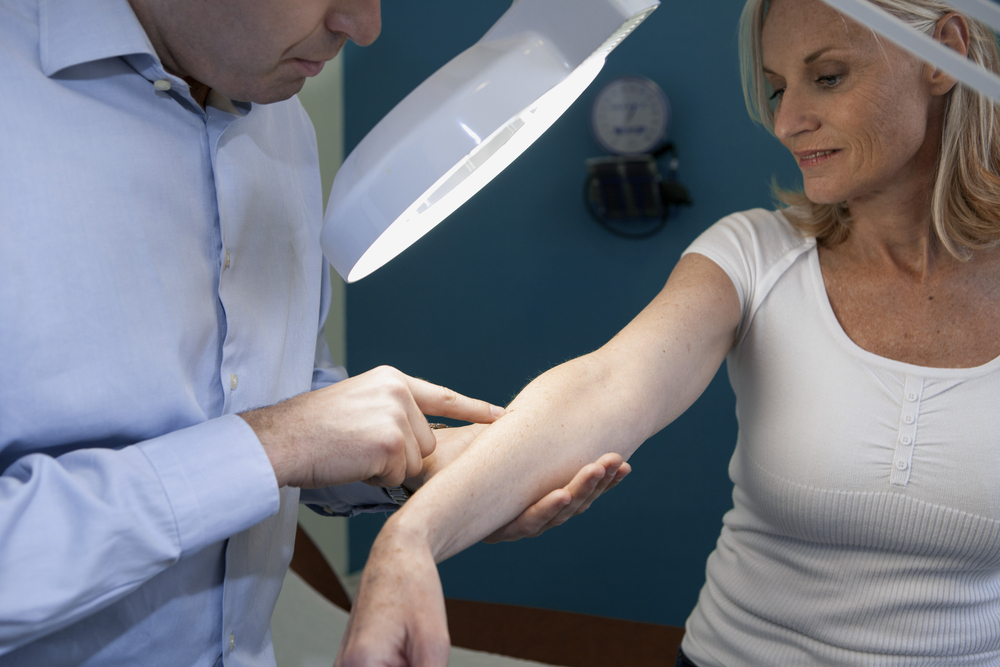Common Cancers in Those Over 60
Category:

Receiving a cancer diagnosis is one of the scariest things that can happen during a doctor’s visit.
Within moments, it can feel like your family’s entire life has been thrown into disarray. This is especially true when dealing with cancer in seniors, who may already have preexisting conditions or risk factors that make cancer even more serious.
Due to significant advancements in medical technology a cancer diagnosis is no longer the death sentence it once was — early detection and being able to recognize symptoms of cancer in the elderly make it possible for seniors to make a full recovery. In this post, we’ll highlight symptoms of cancer in elderly patients to look out for and break down the most common cancers seen in the elderly.
Download Our FREE Guide to Heart Health
Cancer and the Elderly
Simply put, the overall risk dramatically increases for getting cancer in old age.
According to the National Cancer Institute, advancing age is the most important risk factor both for cancer overall and for many individual cancer types. In fact, according to the most recent statistical data from NCI, half of all cancer cases happen in people over the age of 67.
A similar pattern can be observed in many of the most common cancers seen in the elderly — the median age for a diagnosis is 63 years for breast cancer, 66 years for colorectal cancer, 71 years for lung cancer, and 68 years for prostate cancer.
Top 5 Most Common Cancers in Those Over 60
The most common cancers in those over 60 include:
Breast Cancer in Seniors
Breast cancer is one of the most common types of cancer seen in women over the age of 60. Over 316,000 women were diagnosed with breast cancer in 2024, and over 42,000 women died of the illness. Roughly 1 in 8 women in the United States will develop breast cancer.
Symptoms of Breast Cancer in the Elderly
The best way to detect breast cancer early is to get a yearly mammogram, which helps doctors identify breast cancer during its early stages when treatment is simplest. It’s also recommended that women should be familiar with how their breasts normally look and feel and should report any changes to a health care provider right away.
Prostate Cancer
Prostate cancer is one of the most common types of cancer seen in men over the age of 65. Over 313,000 men were diagnosed with prostate cancer in 2024, and over 35,000 men died of the illness. Roughly 1 in 8 men in the United States will develop prostate cancer, however, about 6 in 10 prostate cancers are diagnosed in men who are 65 or older.
Symptoms of Prostate Cancer in the Elderly
While uncommon, symptoms of early prostate cancer include:
- Problems urinating, including a slow or weak urinary stream or the need to urinate more often, especially at night
- Blood in the urine or semen
Symptoms of more advanced prostate cancer include:
- Trouble getting an erection (erectile dysfunction)
- Pain in the hips, back (spine), chest (ribs), or other areas, from cancer that has spread to the bones
- Weakness or numbness in the legs or feet, or even loss of bladder or bowel control, from cancer in the spine pressing on the spinal cord
- Weight loss
- Feeling very tired
Lung Cancer
Lung cancer in old age is extremely common, with more than half of the people diagnosed with lung cancer being over 65 years old and the average age of diagnosis being about 70. Over 226,000 people were diagnosed with lung cancer and over 124,000 died of the illness. Roughly 1 in 17 men and 1 in 18 women in the United States will develop lung cancer.
Lung cancer kills more people annually than colon, breast, and prostate cancers combined — making it the leading cause of cancer death in the US — accounting for about 1 in 5 of all cancer-related deaths.
Thankfully, the number of new lung cancer cases has been declining year over year as more people quit (or never start) smoking.
Symptoms of Lung Cancer in the Elderly
The most common symptoms of lung cancer include:
- A cough that does not go away or gets worse
- Coughing up blood or rust-colored sputum (spit or phlegm)
- Chest pain that is often worse with deep breathing, coughing, or laughing
- Hoarseness
- Loss of appetite
- Unexplained weight loss
- Shortness of breath
- Feeling tired or weak
- Infections such as bronchitis and pneumonia that won’t go away or keep coming back
- New onset of wheezing
Colon Cancer
More than half of the people diagnosed with colon cancer are at least 67 years old. Over 107,000 people were diagnosed with colon cancer in 2024, and over 52,000 died of the illness. Roughly 1 in 24 men and 1 in 26 women in the United States will develop colorectal cancer.
Thankfully, the death rate from colon cancer in seniors has been in steady decline for decades. Improvements to the screening process have empowered doctors to remove colorectal polyps before they can develop into cancers. Screenings have also made it easier to discover colorectal cancer early while it is easier to treat. Medical treatment for these cancers has also improved, reducing the morbidity rate.
Symptoms of Colon Cancer in the Elderly
Much like breast cancer, the best way to detect prostate cancer early is to get a regular screening, which helps doctors identify colorectal cancers during their early stages when treatment is simplest.
Bladder Cancer
More than half of the people diagnosed with bladder cancer are over 65 years old. Over 84,000 people were diagnosed with lung cancer and over 17,000 died of the illness.
Symptoms of Bladder Cancer in the Elderly
The most common symptoms of bladder cancer include:
- Blood in the urine
- Having to urinate more often than usual
- Pain or burning during urination
- Feeling as if you need to urinate right away, even when your bladder isn’t full
- Having trouble urinating or having a weak urine stream
- Having to get up to urinate many times during the night
- Being unable to urinate
- Lower back pain on one side
- Loss of appetite and weight loss
- Feeling tired or weak
- Swelling in the feet
- Bone pain
If you believe you’re recognizing symptoms of cancer in the elderly, contact their doctor for a screening immediately. Early detection is the biggest influencing factor on successful treatment.
If you need help caring for a loved one with cancer learn more about our home care services, contact our caregiving team today at 1-800-GRISWOLD or find a Caregiver near you.
Subscribe
Date: 2025-07-17
Category:


